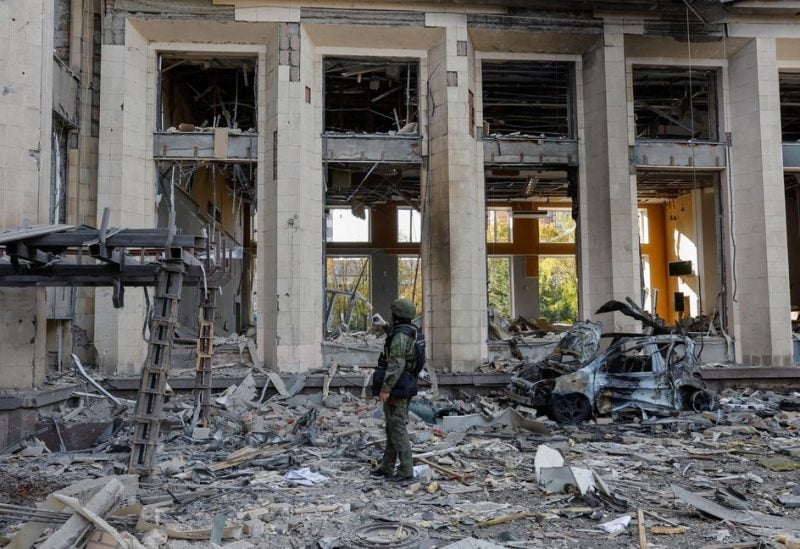
A view shows the city administration building hit by recent shelling in the course of Ukraine-Russia conflict, in Donetsk, Russian-controlled Ukraine, October 16, 2022. REUTERS/Alexander Ermochenko
President Vladimir Putin directed that all of Russia back the military effort in Ukraine, as the Russian-appointed administration of Kherson prepared to depart the only regional capital Moscow has secured during its invasion.
Images of people fleeing the southern city on boats were carried on Russian official television, which depicted the migration – from the right to left bank of the River Dnipro – as an attempt to evacuate residents before the area became a war zone.
The Russian-installed chief of Kherson – one of four Ukrainian regions unilaterally claimed by Moscow where Putin declared martial law on Wednesday – said about 50,000-60,000 people would be moved out in the next six days.
“The Ukrainian side is building up forces for a large-scale offensive,” Vladimir Saldo, the official, told state TV. “Where the military operates, there is no place for civilians.
Staff at Kherson’s Russian-backed administration were also being relocated to the left bank of the Dnipro, he said, although he said Russia had the resources to hold the city and even counter-attack if necessary.
Eight months after being invaded, Ukraine is pressing major counter-offensives in the east and south to try to take as much territory as it can before winter after routing Russian forces in some areas.
Russian forces near Kherson have been driven back by 20-30 km (13-20 miles) in the last few weeks and risk being pinned against the western bank of the 2,200-km (1,370-mile) Dnipro, which bisects Ukraine.
In televised remarks to his Security Council, Putin boosted the powers of Russia’s regional governors and ordered the creation of a coordinating council under Prime Minister Mikhail Mishustin to support his “special military operation”.
He said the “entire system of state administration” must be geared to back up the Ukraine effort.
It was unclear what the immediate impact of Putin’s declaration of martial law would be, beyond much tighter security measures in Kherson and the other three regions.
But Kyiv, which along with the West does not recognise Moscow’s self-styled annexations, derided the move. Presidential adviser Mykhailo Podolyak called it “a pseudo-legalisation of (the) looting of Ukrainians’ property.”
“This does not change anything for Ukraine: we continue the liberation and deoccupation of our territories,” he tweeted.
U.S. President Joe Biden said Putin had found himself in a difficult position and his only tool was to brutalize Ukrainian civilians. The U.S. State Department said it was no surprise that Russia was resorting to “desperate tactics”.
Ukrainian and Russian forces exchanged intermittent artillery fire on a section of the Kherson front in the Mykolaiv region on Wednesday, the impacts marked by towers of smoke.
Several Ukrainian soldiers said they were aware of the martial law declaration but were not worried, although they warned a visiting Reuters reporter of the danger presented by Russian drones.
“For sure he’s (Putin) up to no good. We understand that,” said Yaroslav, who declined to give his last name. “But whatever they are doing, we will screw them anyway.”
Oleh, who also withheld his last name, said Russia in the past had warned about what it claimed would be escalatory Ukrainian actions only to carry them out itself.
“We are just concerned about our people in the Kherson region,” he said.
Moscow denies deliberately targeting civilians, though the conflict has killed thousands, displaced millions, pulverised Ukrainian cities, shaken the global economy and reopened Cold War-era geopolitical fissures.
The Kremlin placed a nuclear umbrella over the regions it says it has annexed on Tuesday, among nuclear threats which Britain’s chief of defence staff said signalled desperation.
“It is a sign of weakness, which is precisely why the international community needs to remain strong and united,” Tony Radakin said during a speech.
British Defence Minister Ben Wallace met his U.S counterpart in Washington this week to discuss shared security concerns about the situation in Ukraine, a senior defence source said in response to speculation around the sudden trip.
Ukrainian cities have been struck in recent days by drones and missiles, and on Wednesday, a Russian missile strike hit a major thermal power station in the city of Burshtyn in western Ukraine, the region’s governor said.
Ukrainian President Volodymyr Zelenskiy, who has said a third of his country’s power stations have been hit by Russian strikes, discussed security at power supply facilities with senior officials.
“We are working to create mobile power points for the critical infrastructure of cities, towns and villages,” Zelenskiy wrote on the Telegram messaging app.
“We are preparing for various scenarios of possible consequences. Ukraine will defend itself. No matter what the enemy plans and does.”
General Sergei Surovikin, the new commander of Moscow’s forces in Ukraine, gave a gloomy assessment of Russia’s prospects.
“The situation in the area of the ‘Special Military Operation’ can be described as tense,” he told state-owned Rossiya 24 news channel.
The position in Kherson was “difficult”, he said, adding: “The enemy is deliberately striking infrastructure and residential buildings.”
Andriy Yermak, head of the Ukrainian president’s office, accused Russia of laying on a “propaganda show with evacuation” there.
“The Russians are trying to scare the people of Kherson with fake newsletters about the shelling of the city by our army,” Yermak wrote on the Telegram messaging app.